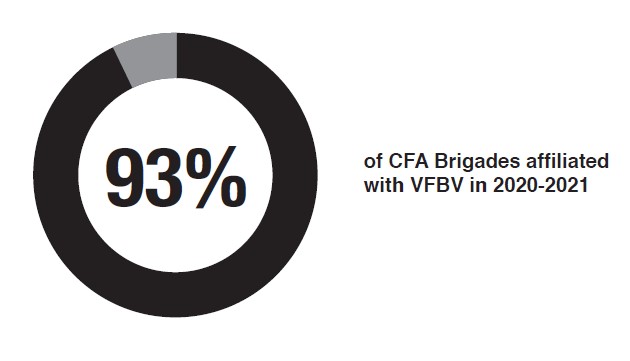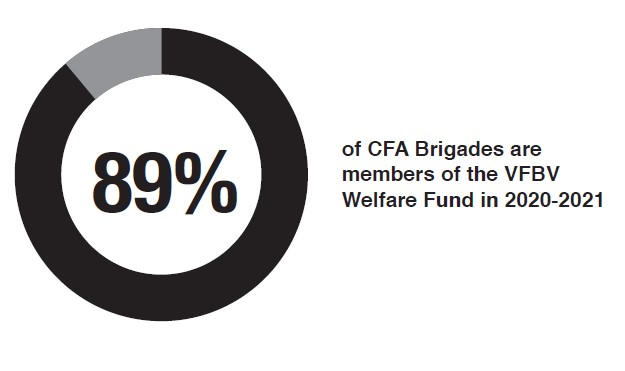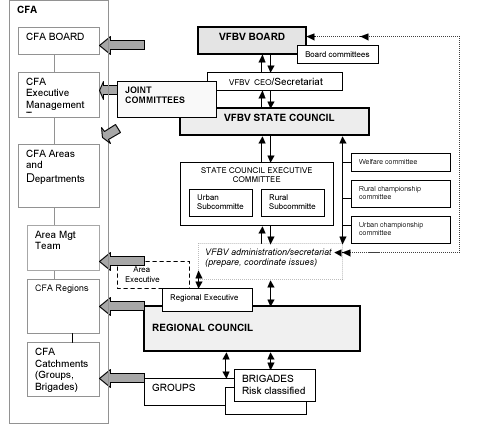Affiliation with VFBV
Affiliating with VFBV
Any CFA Brigade or Group can affiliate with the VFBV. Invoices for Brigade & Welfare Fund affiliations are sent out by mail.
To be eligible to subscribe to the Welfare Fund, your Brigade must be affiliated with VFBV, which pays all of the Fund's operating costs.
The number of Brigades and Groups affiliating with VFBV has risen steadily in recent years to record levels.
 |
 |
Advantages of Affiliation
Volunteer Fire Brigades Victoria (VFBV) is the voice of CFA Volunteers, and is established under the Country Fire Authority Act. VFBV represents all CFA volunteers in communication with the CFA Board and Management, Governments, Members of Parliament, councils, instrumentalities, business and the public.
CFA is a volunteer-based emergency service, providing an internationally renowned and cost effective system of protecting our state from fire. In the interests of maintaining and developing the service, with its inherent community capacity building advantages, VFBV provides CFA with a direct connection to the volunteers, and the benefits of their experience and practical advice on;
•strategic and practical leadership;
•effective planning;
•volunteer support services;
•recruitment and sustainment programs;
•accessible quality training;
•equipment and infrastructure.
VFBV maintains direct links with grass roots volunteers, understanding their issues, needs and concerns through a state-wide network of District Councils and elected volunteer representatives. The VFBV Board meets with the CFA Board as the peak forum for strategic consultation on matters affecting volunteers, from policy development and volunteer welfare, to equipment, infrastructure, volunteer development and planning for CFA’s future. VFBV and CFA also have Joint Committees that meet regularly with CFA Department Heads and Chiefs to discuss all matters affecting volunteers. The two organisations also form working parties from time to time to work through smaller or one-off projects.
Make your Voice Heard
Affiliation gets you a seat at this very important table, and gives you a voice. Affiliation entitles you to send two delegates from your brigade to be represented at District Council, and entitles you to two votes on all matters raised for endorsement. Your delegates are able to influence policy and decision, as well as represent your brigades’ views and concerns at a District level, and at a State level through State Council. Your Brigade can also apply for representation on Joint-Committees, Working Parties and Reference Groups by getting involved in your District Council.
Some brigades think that they should only be affiliated if they wish to compete in the Urban or Rural Championships. Whilst the championships provide an important further dimension to Brigade life and the role the volunteer association plays in a coordinating and supportive role, there are many other reasons why affiliation should be important to your Brigade.
Affiliated Brigades have access to a wide field of support that comes from our statewide representation. Not only can this be a crucial sounding board, where your brigade can learn from the experiences of hundreds of other brigades, but the depth of knowledge and commonality of issues means your Brigade can receive assistance on any number of issues that arise from time to time. Whether it’s advice on a new appliance, help in influencing a CFA policy or decision, or help in mediating an issue between your Brigade and a CFA Officer or Manager, you have ready access to a broad range of support. Because of our strong representation at all levels of CFA, we have the negotiating power and strength that comes from numbers that make VFBV a strong advocate on issues that affect your Brigade and all CFA volunteers.
Affiliation also makes your brigade eligible to be a part of the Welfare Fund, which provides support to volunteers facing difficult financial situations due to loss of work, family illness or death, accidental injury or even drought or floods. When your 0Brigade subscribes, the fund provides coverage for all volunteer members of the brigade, their families and any ex-member of a brigade who was a registered volunteer for 20 years or more.
The Benefits
In summary, if your Brigade wants its voice to be heard, if you think your Brigade should have an effective say in CFA policy and procedures, then it is crucial that you affiliate. Being part of VFBV provides your Brigade with a direct pathway to CFA and its decision makers, and offers strong volunteer representation through District Councils, Forums, Joint Committees and working parties. It provides your Brigade with a gateway to a broad range of support and knowledge, and provides crucial assistance and support in the times when you need it most.
Through affiliation, all brigades can share experience, knowledge and costs, to the benefit of every CFA volunteer. Every affiliated brigade plays an important role in our efforts to maintain an effective community based volunteer system of fire and emergency service, supported by highly trained and dedicated operational, training, support and administrative staff at strategic locations.
A brigade on its own has a limited capacity to influence. Being part of a statewide network of brigades that are focussed on your issues and needs provides strong and credible representation at the highest levels of the CFA’s organisation. VFBV not only provides your brigade with practical support, but also strategic support in ensuring volunteers get the respect, recognition and support for themselves and their families, and for their self sacrifice and the commitment they make to protecting our community.
Affiliation with VFBV is an investment in building the CFA of tomorrow into a more effective emergency service that makes use of the experience and knowledge of its volunteers and looks after their needs.
Annual Reports
VFBV Annual Reports are presented at each years Annual General Meeting, and then posted to all member Brigades shortly thereafter. (usually October).
| Filename | Size | Date |
|---|---|---|
| 7.73 MB | ||
| 3.8 MB | ||
| 2.62 MB | ||
| 2.18 MB | ||
| 3.15 MB | ||
| 4.79 MB | ||
| 3.72 MB | ||
| 3.55 MB | ||
| 2.75 MB | ||
| 3.77 MB | ||
| 10.29 MB |
Championships - Introduction and History
Upcoming State Championships
The 2024 State Championships will all be held in Mooroopna over consecutive weekends in March for the fourth year in a row.
The weekend 16 and 17 March will host the State Urban Junior Championship. The following weekend, 23 and 24 March, will see the State Urban Senior Championship run over both days. While the State Rural Senior Championship will be run on Saturday 25 March and the State Rural Junior Championship on Sunday 26 March. The events for each championship will be conducted separately on their own competition tracks, but alongside each other at the same location, on the same weekend, in what is a showcase of CFA to the wider community.
On the evening of Saturday 23 March, the Torchlight Procession will be held. The procession will begin at 8:30pm on the Saturday night.
VFBV State Championship History and Introduction
VFBV State Championships are one of Victoria's proudest and longest traditions, running for nearly 150 years with the first State Championship held in Melbourne in 1873, with the volunteer associations running and organising these events some 70 years before CFA even existed. State Championships have continued annually since 1873 with no state event cancelled due to fire, flood, weather or natural disaster – the only cancellations being due to WW1, WWII and the COVID-19 pandemic.
The establishment of volunteer fire brigades in country Victoria began in 1854 with brigades formally established at Geelong and Sandhurst (now Bendigo). The introduction of hose reels into the Fire Service to assist in getting hose and other necessary equipment to the scene of a fire relatively quickly, was a major catalyst for fire brigade competitions, as we know them.
The Championships, initially known as ‘Demonstrations’ as they were viewed as a demonstration of firefighting skills, arose from an awareness that fire brigade operational response and training could be enhanced if it was performed in a competitive environment. Brigades soon discovered their training and efficiency improved by engaging in training and competitions with neighbouring brigades, with the State Championship evolving as the pinnacle of the season’s competitions conducted by Districts and Associations across the state.
After the first two Championships were held in Melbourne 1873 and 1874, and given the vast distance many country and regional Brigades travelled to attend the Melbourne events, it was agreed that other venues should have the opportunity of hosting future Championships. This was also seen as a way to fairly distribute the economic benefits of increased tourism and patronage in townships as a result of each year’s competitions, and honoured volunteer firefighters dedication to putting their communities first.
Today, competitions and the State Championships remain an integral part of CFA activities, attracting every year volunteer and career firefighters from across the state and interstate, competing against each other in a range of events designed to hone their firefighting skills and put their skills to the test in a demonstration of their unique life and property saving skills. Speed and accuracy are vital as the firefighters compete in events using a range of traditional and modern-day firefighting equipment.
Since 1873 - VFBV (and its predecessor associations) coordinate and arrange all Fire Brigade championships and competitions in Victoria, and selects the venues, approves the events and rules of the competitions, and appoints/supports all track officials and judges for the Championships. Under the CFA Act, we must seek the approval of CFA for each year’s events held within the country area of Victoria. CFA support the running of these Championships through the provision of annual grants to contribute to the running costs of hosting each year’s events, as well as reimbursing competitors for travel expenses to attend the State Championship – in recognition that many Brigades are required to travel hundreds of kilometres to attend each years State Championships.
State Championships allow volunteer firefighters to test their skills and prowess against opposing Brigades in a congenial atmosphere and provides an opportunity to strengthen existing friendships and form new bonds with Brigade members throughout Victoria and interstate. Unlike a real bushfire or structural fire situation, which often pits firefighters against mother nature and where lives and property are at risk, these drill competitions are more firefighter versus firefighter, and Brigade versus Brigade, which allows for a more friendly opponent than mother nature.
The urban championships in the main involve traditional events and many still include the use of the reel as was the case in the early 1900s.
On the other hand the events at the rural championships which evolved in the 1950's are based around more current fire ground practices and most use either tankers or replica tanker stands for most of their events. Earlier rural championships held competitions such as rope climbs and knapsack races which have now been discontinued in favour of more tanker based activities.
The benefits and objectives of our competitions and State Championships are to:
- increased operational firefighting efficiency and discipline
- develop, maintain and enhance the operational skills of firefighters by providing a competitive environment to promote and hone training and skills maintenance in core and fundamental firefighting skills and practices
- develop teamwork and leadership skills of individuals and Brigades
- increased health and fitness development and promotion of healthy lifestyle and its correlation to increased firefighting efficiency and effectiveness
- promote comradeship amongst firefighters, sense of belonging and networking
- encourage family participation and strengthen community engagement and involvement in local Fire Brigade’s
- encourage our future CFA volunteer firefighters and provide early exposure to young people to instil a sense of community service and the importance of local Fire Brigade’s
- promote a professional image of CFA to the community
- instil and promote the Australian tradition of having a go, and doing your best
- promote and recognise our future CFA, Brigade and VFBV leaders and celebrate excellence
Media Releases
Our Structure
Structure
The diagram below illustrates the overall structure of VFBV and process links between key VFBV forums plus the links and inputs to decision making levels of CFA Management. In simplest terms the roles of the three levels can be described as follows:
Board – Governance, strategic direction, policy and oversight;
State Council – is the operating level, key advisory forum and State wide representation;
District Councils – allow local level input and the local operating level
The VFBV CEO and staff secretariat provide overall coordination, management, advice and support to the Association at each level.

You can download a copy of the VFBV Constitution at the bottom of this page.
The roles of the three key levels of VFBV are:
Role of VFBV Board
- Governing body, responsible and accountable for the control of the business affairs, performance and governance of the Association;
- Determine policy and direction for the Association;
- Determine VFBV policy on matters referred by CEO or State Council;
- Appoint the CEO and monitor the CEO’s performance;
- Ensure the VFBV’s financial affairs are effectively managed and controlled;
- Ensure adherence to the Association’s Statement of Purposes;
- Ensure internal communication and consultative processes effectively engage membership;
Role of VFBV State Council
- Provide a forum for expression of views from Regional Councils and ensure issues raised by Regional Councils are addressed in a timely and satisfactory manner;
- Consider matters referred to it by VFBV Board and CEO and make recommendations on action to be taken;
- Elect State Council Executive Committee;
- Select representatives to VFBV/CFA Joint Committees;
- Manage process for selection of VFBV Board members;
- Make recommendation to VFBV Board for CFA Board nominations;
- Provide guidance to VFBV representatives on CFA/VFBV Joint Committees and be a conduit between VFBV Board and Regional Councils;
- Advise VFBV Board on the business affairs of the Association.
Role of District Councils
- Provide a forum for affiliated brigades to express volunteer concerns/views;
- Help brigades resolve matters of concern at local level;
- Provide volunteer leadership and represent volunteers at CFA Regional level;
- Provide a conduit for communication and information flow between VFBV Board, State Council and brigades;
- Refer matters that cannot be resolved at local level to VFBV State Council or CEO.
 Championships
Championships 
